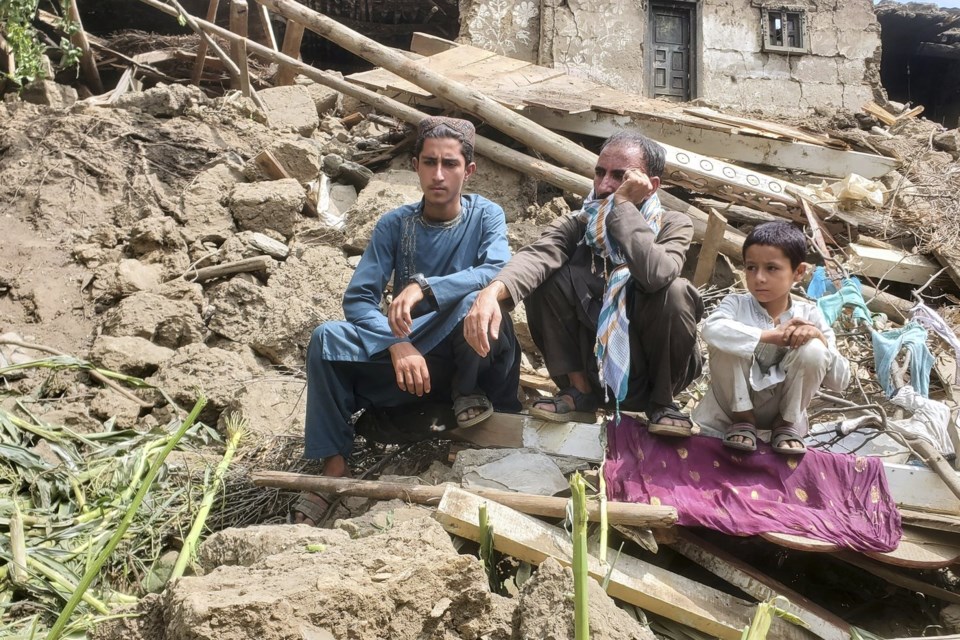OTTAWA — Ottawa says it's ready to help Afghans in the wake of Sunday's deadly earthquake — even as one organization warns that the federal Liberals have made it harder to reach those living under Taliban rule.
"Canada stands ready to support the Afghan people, with our humanitarian partners," Canada's Secretary of State for International Development Randeep Sarai wrote Monday on social media.
As of late Tuesday, the federal government had not announced any emergency aid.
The Taliban government said more than 1,400 people have died and more than 3,000 have been injured since a large earthquake hit eastern Afghanistan.
Afghans have been struggling with hunger and disease since governments blocked financial ties to the Taliban regime that took over the country in August 2021. Many countries have meanwhile cut back on foreign aid spending and contributions to United Nations agencies.
The United Nations says half of Afghanistan's population of 46 million is in need of humanitarian aid. It says the country has struggled to integrate its 2.5 million citizens who returned this year, often by force, from countries where they sought safety or better living standards.
UN Refugee Agency spokesman Babar Baloch wrote Tuesday that women and children "will again be among those most at risk" as a result of Sunday's earthquake, and that humanitarian efforts "may be further complicated" by Taliban restrictions on female aid workers.
"The gravity of the situation requires immediate attention," said Asma Faizi, head of the Toronto-based Afghan Women's Organization. "Unfortunately. Afghanistan has been lost in the shuffle of these other international crises."
Her group supports Afghan newcomers to Canada as well as women living in Afghanistan and in exile in nearby countries.
The organization runs an all-girls orphanage in Kabul which has been blocked from receiving Canadian aid since the Taliban takeover, due to restrictions that most of Canada's peer countries dropped years ago.
In the months after the Taliban took hold of Afghanistan, the UN and countries such as the U.S. and Australia issued exemptions to terrorism laws to allow aid organizations to continue their work in Afghanistan as long as they don't intentionally support the Taliban.
Ottawa took a different approach by warning aid groups that paying any tax to the Taliban — including on salaries for drivers or construction workers — could lead to prosecution for financially supporting a terrorist organization.
Nearly two years after the Taliban takeover, Ottawa passed a law that issued an exemption for humanitarian work — such as providing food and water — while requiring special permits for any development work, such as building a school. It took Ottawa an entire year to start taking in applications for those permits.
Faizi told Parliament as it debated the legislation that the line between humanitarian and development work is not clear — a point echoed by other groups, such as World Vision Canada.
Faizi said the law could now hinder efforts to help Afghans affected by this weekend's earthquake.
She gave the example of vaccinations. Aid groups worry they'll be prosecuted for supporting a terrorist organization if they give shots to Afghans stuck in cramped quarters with no clean water, she said.
"Our government sees it as clearcut," she said. "The humanitarian sector does not know at what point it will be crossing into the realm (requiring) authorization, and our government has not provided the guidance that is required."
In June, the government published the first annual report required under the legislation that changed the permitting process.
The report said that Ottawa had issued just two permits, both in 2025, out of the 14 applications it had received since June 2024. The applications were for work in Afghanistan and also the Gaza Strip and Syria, since those areas can also be deemed to be under control of a listed terrorist organization.
Only four applications came from aid groups; the other 10 were "government sponsored" — meaning a federal department or agency had applied, or Ottawa filled out the application as part of an aid project it had funded.
The applications were for groups to provide "health services, education services, livelihoods programming, human rights programming, immigration and safe-passage services." These are all things Afghanistan desperately needs, Faizi said.
"In order for the country of Afghanistan to survive, to thrive and to come out of this poverty, there needs to be more longer-term programs — like the ones that are caught under the authorization regime," she said.
In a study Faizi published in August 2024 for the Canadian Council of Muslim Women, she found aid groups were alarmed by how much personal information the permit applications required. Smaller organizations told her they lacked the funding to have lawyers verify whether projects they had planned in Afghanistan would lead them to be branded as terrorists.
"It created a presumption of criminality that didn't exist before," she said.
Faizi said desperate people in Afghanistan will continue turning to terrorist groups if the world doesn't fix the problems that stem from military occupations, the chaotic withdrawal of U.S. troops and aid cutbacks.
"It's not just dealing with the current earthquake, but it's dealing with these compounding problems," she said.
Ottawa has continued funding UN projects in Afghanistan that don't involve Canadian aid workers. Canada has also joined a legal process that could have the Taliban brought before the International Court of Justice over its treatment of women.
Faizi said these moves are welcome but Ottawa needs to go beyond high-level diplomacy and issuing permits for individual aid projects.
"Canada does need to sit down and figure out what position it is going to take vis-à-vis humanitarian aid inside Afghanistan," she said.
"If the women are dying of starvation inside Afghanistan, then you're not really helping in the long run."
This report by The Canadian Press was first published Sept. 2, 2025.
Dylan Robertson, The Canadian Press



